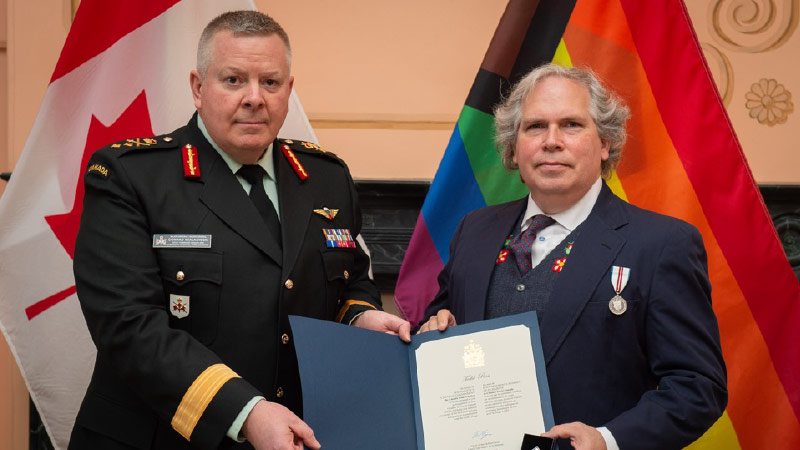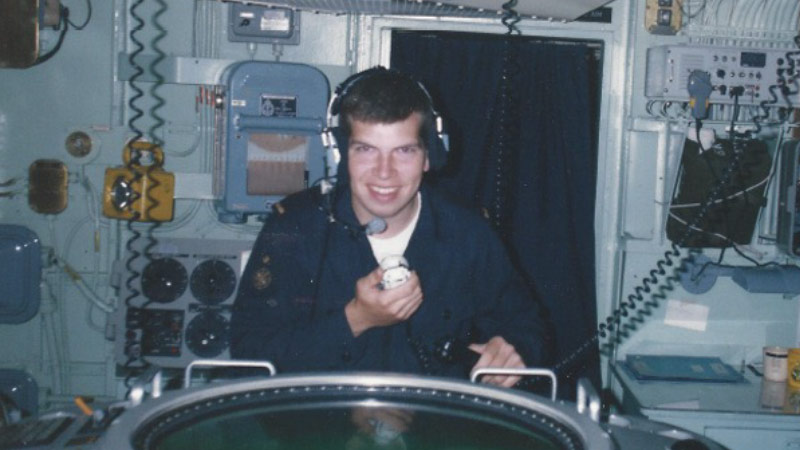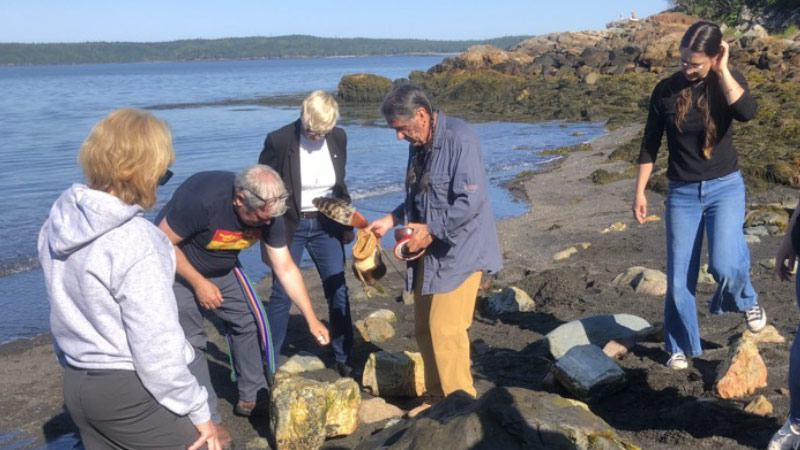LGBT Purge survivor Todd Ross reflects on life of activism and allyship
Author: Kayla Cormier
Posted on Aug 9, 2024
Category: UNB Saint John

In honour of Saint John Pride 2024, we had a conversation with Todd Ross, a remarkable two-spirit (2S) Métis activist for the 2SLGBTQIA+ and Indigenous communities on campus and beyond. His work in both communities intersects and overlaps.
Ross is the Indigenous Advisor at the University of New Brunswick’s (UNB) Saint John campus. He is a self-proclaimed “New Brunswick kid,” having grown up in St. Stephen.
Ross reflected that “it wasn’t safe to come out” growing up in rural N.B. “I knew I was gay and stayed in the closet.”
Ross joined the Royal Canadian Navy in 1989. In 1990, after serving for one year, he was expelled during the LGBT Purge led by the Canadian Government. “I was kicked out of the military, having received an honourable discharge, but there was nothing honourable about how I felt,” he said.

Despite the trauma Ross endured, he used his story and considerable talents to build an impressive public service career.
“Canada made an activist out of me,” he said.
Nearly thirty years after his dismissal, Ross sat in the House of Commons across from Prime Minister Justin Trudeau to listen to the formal apology for the Canadian Government’s role in the LGBT Purge.
This was a turning point for Ross and many other purge survivors.
“When I was kicked out for being gay at the age of 21, I never thought I would hear that apology. Wearing the Canada Pride Citation lapel pin issued by the Canadian Government brings a feeling of taking back what was taken from you,” Ross said.
“It was incredibly validating and a real shift for so many of us. It helped us reclaim our identities as veterans and to regain our pride as people who served our country,” he said.
Ross was one of three lead plaintiffs in the class action lawsuit that led to the $145 million dollar settlement. However, this wasn’t his first foray into activism. Shortly after he was dismissed from the military, he moved to Vancouver.
“There was a horribly homophobic syndicated columnist who was writing for papers around Vancouver at that time,” he said.
“My roommate and I started a petition. We went to a local gay bar and got a twenty-dollar donation so we could photocopy and create a petition calling for this guy to be fired. We submitted it to the B.C. Human Rights Tribunal.”
“He kept his job, so we weren’t terribly effective,” Ross laughed, “But we raised awareness around the issue, which is what felt most important.”
Ross ended up in Toronto, where he got in touch with the local Métis community. He lived and worked in the Gay Village and took part in local 2SLGBTQIA+ protests. He volunteered and worked in the community supporting AIDS action and those living with HIV, and later worked for George Smitherman, the first openly gay cabinet minister in Toronto.
In 2017, Ross travelled to Jerusalem for World Pride, where he met a young man who was almost killed for being gay. From this experience, he and a group of allies founded Rainbow Railroad, an organization that aids 2SLGBTQIA+ refugees on their path to safety.
“I don’t want other queer people to go through what I went through,” he said.
Ross is also co-chair of Rainbow Veterans of Canada, which undertakes outreach, education and advocacy work not covered by the Canadian Government’s settlement agreement.
More recently, Ross and his partner moved back to New Brunswick and have been involved in the local Pride communities.
“I’m with Charlotte Country Pride - so St. Stephen, St. George and St. Andrews. It’s not the biggest Pride in the world, but it’s important for me to raise awareness locally,” he said.
As co-chair of the LGBT Purge Fund, Ross is involved in an upcoming exhibit at the Museum of Human Rights in Winnipeg that will tell the story of LGBT purge survivors.
The exhibit has three parts: a permanent niche at the Museum, a travelling exhibit that will open in Calgary in August and will eventually make its way to New Brunswick and a major one-year exhibit that will open in Winnipeg in February 2025.
It will include historical documents from this period, such as military and RCMP directives, the story of the “fruit machine” - a campaign by the Canadian Government to try to detect queer people during the purge era - and more.
“The museum exhibit will also touch on the history of homophobia and how the purge began,” Ross said. “Homophobia is part of colonization.”
Ross is also working with a team on the Thunderhead Monument - a monument being built to recognize the profound hardships faced by 2SLGBTQIA+ people in Canada for living authentically. It will open in 2025 around Capital Pride.
Thunderhead will be cylindrical in shape with inverted clouds in the interior.
“It will be lined with mirrored tile to gay it up a little bit,” Ross laughed. “It will feel like you’re inside a disco ball.”
Beside the monument, there will be a sacred fire within a circle of 13 stones from the Canadian provinces and territories. These stones are being gathered by Indigenous leaders and 2S elders from different provinces.
This month, Ross and a group of UNB students and community members were joined by Grand Chief Ron Tremblay at Black Beach in Lorneville, where they selected the stone that will be going to Ottawa as part of the Thunderhead monument.
“We spent about two hours on the beach selecting the stone and doing ceremony,” Ross said. “It was important to come to the Bay of Fundy, a place by which the Passamaquoddy, Wolastoqey and Mi’kmaq are connected.”

Ross’ work on the exhibit and the Thunderhead monument are dear to him.
“We want to make sure we memorialize survivors. That we remember them. The museum exhibit and Thunderhead monument are ways we can do that.”
At UNB, Ross is pursuing his master's in interdisciplinary studies with a focus in sociology and political science. His research focus is on self-determination in First Nation, Inuit and Métis communities in Menahqesk (Saint John).
Ross is also teaching a course this fall, NURS1333: Wolokehkitimkil - Indigenous Health and Healing, for Step up to Nursing students coming to UNB to complete their bachelor of nursing. The focus of this course is to build an understanding of Indigenous health and wellness to promote equitable healthcare practices and policies.
“It’s a wonderful experiential learning opportunity for UNB students,” Ross said. “It incorporates the concepts of the word piluwitahasuwawsuwakon, which means ‘allowing your thinking to change so that action will follow in a good way toward truth.’”
